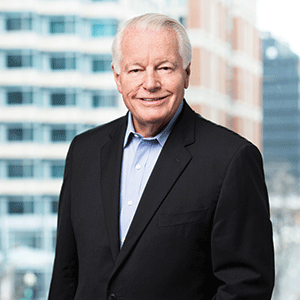Name: Roger Dow
Title: President and CEO
Organization: U.S. Travel Association, since 2005
Location: Washington, D.C., and Fort Lauderdale, Florida
What is the biggest challenge the meetings industry faces today?

It is the ability to get people to meetings. We have to be able to process visas in a timely basis.
When I was coming up through Marriott doing sales and marketing, as long as you were satisfying the U.S. customer, you were fine. That has changed drastically. If we don’t have international attendees at our meetings, we run the risk of no longer being relevant. If it is just a bunch of Americans talking to ourselves, people won’t see it as representing all the options in a global marketplace.
What will help smooth the path to international attendance at meetings?
Elected officials need to understand that we aren’t the fun-and-games folks. The meetings industry is hard work and face to face is how business gets done. Legislators need to understand that as the meetings industry goes, so goes the U.S. economy and jobs. If we don’t have the right people coming to our meetings, they may go to Seoul, South Korea, and buy Mitsubishi tractors instead of coming to the U.S. and buying a John Deere tractor.
We also need Open Skies agreements because we don’t have enough lift to get people here from around the world who need to come. The game plan from the domestic airlines is to limit growth to 2 percent a year. They want to increase profitability by increased load factors, moving planes to the most productive markets and charging fees—baggage fees, change fees. The meetings industry has a different model. They want to grow profits by growing customers by 8 percent or more.
U.S. carriers have asked to limit Middle Eastern airlines. But that affects travel from Southeast India, Asia and Africa because our airlines don’t have capacity devoted to that area.
We are at 81 million visitors now each year and we are looking to get to $100 million by 2021, and we don’t have enough seats. Open Skies and modernization are how we will get there.
How do you describe the importance of the industry to policy-makers?
We hold travel talks. Over the last five years, we have hosted 200 half-day meetings with local congressional representatives. We took them back of the house through a hotel with representatives from the convention and meeting industry, and watched the shock on their faces when they learned how many and how diverse the employees are who keep hospitality businesses going. It opened up their eyes to how many people are in this labor-intensive business and how they are building careers. That experience builds travel champions who understand the business and realize it is driving jobs for constituents.
Destination Capitol Hill brings people to Washington, D.C., from multiple cities and destinations for meetings with representatives. When we can get someone from Fargo to sit with their elected official and talk about how important it is to drive business to meetings, that is much more effective than when I do this.
Are they getting the message?
We just had a huge turnover in our government. Another 121 first-time legislators came in this year and we have to educate them on the economic value of meetings.
We are a white-hat industry. Whether you are Republican or Democrat, a healthy meetings business can help any local district’s economy. The more people attend meetings, the more teachers and firemen they can hire.
Plus, meetings are a front door to economic development. A trip to a meeting is often the first step to buying a second home, moving to a city or opening a business there—$52 billion is invested in real estate each year by people from outside the U.S.
How can event professionals tell their story effectively?
They can explain that this industry helps grow careers by taking people with limited skills and making them highly employable. It isn’t like engineering, where if you don’t have a degree or live in the right city, you won’t get a job in tech. In the meetings industry, you can live anywhere and work tomorrow. It is labor-intensive and widely distributed.
This is one of the few industries that has a positive balance of trade. When someone from Germany comes to the U.S. and attends a meeting, that has the same effect as buying an Intel computer or a Chevrolet car. It is an export. They come and leave their money. We don’t have to educate their children or fix their potholes. They don’t take our resources.
Plus, they go back and tell our story. Research shows they are 75 percent more likely to be positive about our country and our products.




